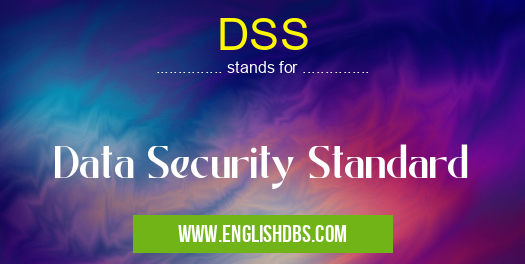What does DSS mean in BUSINESS
Data Security Standard (DSS) is an information security regulation which was developed by the Payment Card Industry Security Standards Council (PCI SSC). It outlines a set of requirements for protecting cardholder data collected, processed and stored by all organizations doing business with major card brands, such as Visa, MasterCard, American Express and Discover. These requirements range from how customer information is collected to how it is stored and accessed, as well as how it is transmitted over public or private networks. DSS applies to any organization that stores, processes or transmits cardholder data including merchants, service providers and financial institutions.

DSS meaning in Business in Business
DSS mostly used in an acronym Business in Category Business that means Data Security Standard
Shorthand: DSS,
Full Form: Data Security Standard
For more information of "Data Security Standard", see the section below.
What does DSS mean?
DSS stands for Data Security Standard - an important set of standards created by the Payment Card Industry Security Standards Council (PCI SSC). It provides guidelines for securely collecting, processing and storing customer information from credit cards of major brands such as Visa, Mastercard, American Express and Discover. The standard helps organizations protect themselves from fraud and other cyber crimes by implementing effective security measures for customer information.
What does DSS mean in Business?
In business settings, DSS stands for Data Security Standard. DSS provides a comprehensive framework that defines processes to ensure the secure handling of customer information collected through various payment methods such as credit cards. It establishes baseline requirements such as encryption techniques and authentication protocols which companies must implement in order to protect their customer's personal data from potential threats like theft or malicious misuse. Adopting the Data Security Standard can help businesses demonstrate compliance with industry regulations while also protecting customer data in accordance with accepted security best practices.
Essential Questions and Answers on Data Security Standard in "BUSINESS»BUSINESS"
What is Data Security Standard?
Data Security Standard (DSS) is a set of protocols and technical requirements designed to help organizations secure their confidential data and protect their customers' private information. The standard includes principles such as access control, encryption, authentication, and authorization. These principles are used in combination with organizational policies and procedures to create an effective security posture that can be monitored consistently.
What benefits does DSS provide?
DSS provides organizations with a comprehensive set of tools to secure their confidential data and keep customer information safe from unauthorized access or malicious intent. It helps organizations meet privacy regulations while also providing customers the assurance that their data is protected. Additionally, following DSS guidelines promotes good data governance by instituting consistent standards across an organization's entire technology stack.
How does DSS support compliance?
Compliance with regulatory frameworks often requires adherence to certain data security standards. By implementing the protocols outlined in the DSS, organizations can demonstrate their commitment to securing confidential information and fulfilling mandatory requirements set forth by governing bodies. Additionally, staying in compliance enables organizations to avoid costly penalties or sanctions for non-compliance.
What is the scope of DSS coverage?
The coverage provided by DSS depends on the specific requirements of each organization; however, it typically covers areas such as physical security measures, network security controls, application security measures, encryption protocols, user authentication requirements, incident response plans, system access controls and audit processes. It also includes policies for periodic reviews of security measures.
Does meeting DSS require regular audits?
Yes – it is important that organizations regularly review and audit their systems and processes according to industry standards such as PCI-DSS or ISO/IEC 27001. This allows them to identify any weaknesses in their Data Security Strategy while reducing the risk of data breaches.
How do I know if my business needs DSS certification?
Generally speaking, if you store any kind of customer data or sensitive company information on your systems then you should take steps to ensure that it is secured according to industry best practices. Organizations should always seek consultation from a qualified professional to determine what steps must be taken in order for them to remain compliant.
Is there formal training for learning how to implement DSS?
Yes – there are several educational resources available for those interested in understanding more about data security standards and best practices. Many universities offer courses related to cybersecurity as well as certifications such as CISSP (Certified Information Systems Security Professional). Additionally, various 3rd party vendors offer specialized training services tailored specifically for those looking to implement effective Data Security Strategies.
Final Words:
Data Security Standard (DSS) is an important set of standards created by the Payment Card Industry Security Standards Council (PCI SSC) to provide organizations with a comprehensive framework for protecting customer data collected through various payment methods such as credit cards. DSS helps companies establish baseline requirements for securely collecting, processing and storing this sensitive data while also demonstrating compliance with industry regulations related to privacy and security best practices. By adhering to the DSS standards, businesses can ensure that their customers’ private information remains safe from any potential threats or misuse by unauthorized persons.
DSS also stands for: |
|
| All stands for DSS |
